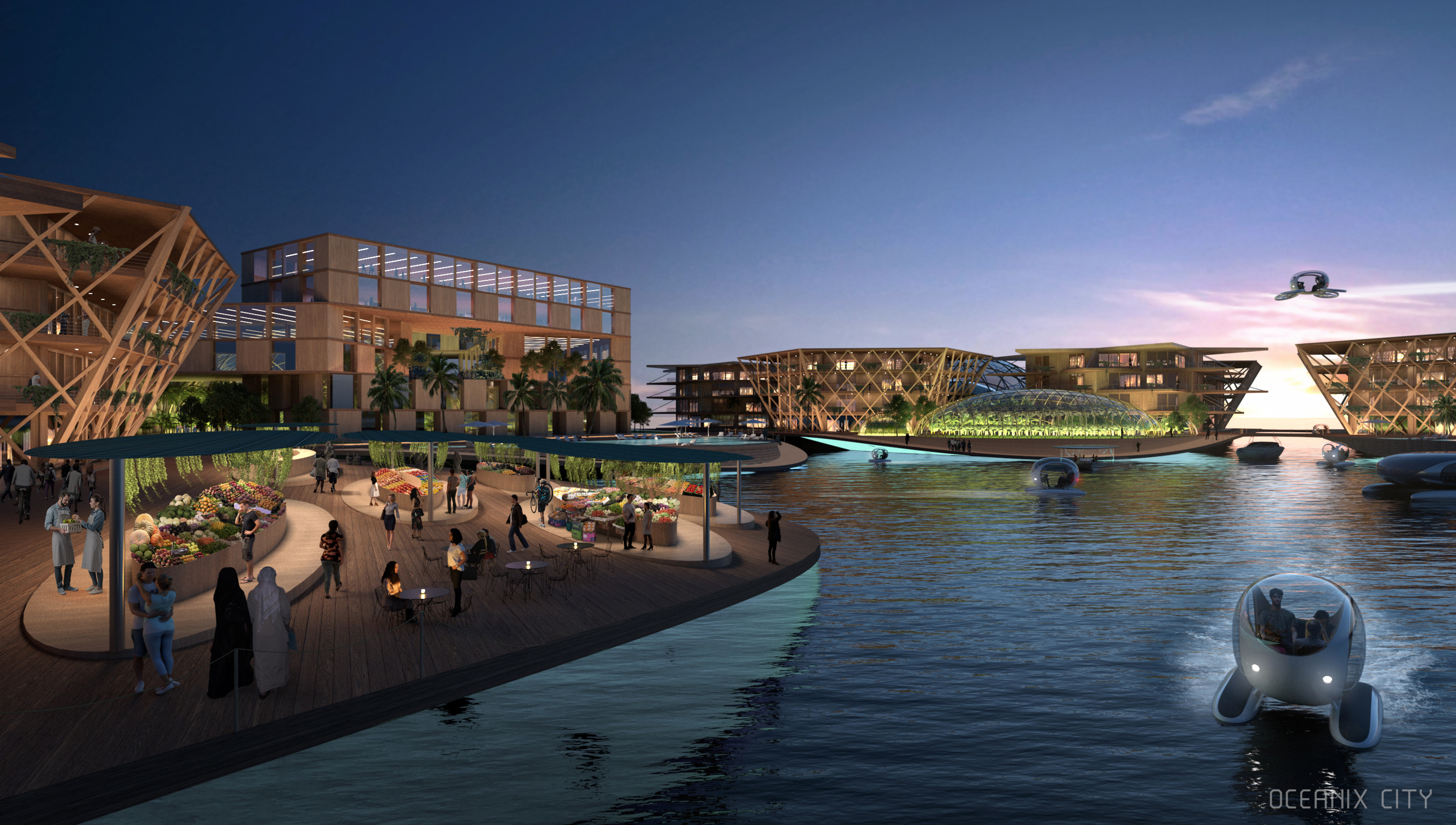This is what the world’s first floating city will look like

South Korea will start building a floating city for 12,000 residents in 2023. Image: OCEANIX/BIG-Bjarke Ingels Group

Get involved with our crowdsourced digital platform to deliver impact at scale
Stay up to date:
Climate Crisis
Listen to the article
- The world’s first prototype floating city that adapts to sea level rise has just been unveiled at UN headquarters in New York.
- OCEANIX Busan, in South Korea, aims to provide breakthrough technology for coastal cities facing land shortages and the threat of climate change.
- When built, the three interconnected platforms, totalling 15.5 acres, will provide homes for a community of 12,000 people.
- It’s one of many solutions being found to the growing issue of rising sea levels.
Housing the growing global population is one of the key challenges facing policymakers today - and one made even more challenging by climate change.
Without curbing emissions, it’s predicted more than 800 million people, living in 570 cities around the world, could be at risk from sea level rise by 2050, according to the C40 network of global cities addressing climate change.
The network estimates the cost of rising sea levels and inland flooding could reach $1 trillion by mid-century.
But it’s hoped that this sustainable floating city prototype could go some way to solving the problem of providing safe homes for vulnerable coastal communities.
World's First Floating City
What’s the World Economic Forum doing about climate change?
‘Solutions to global challenges’
OCEANIX Busan, based in the waters off South Korea’s second-largest city, was recently unveiled at the UN headquarters in New York. It’s a collaboration between UN-Habitat, the Busan Metropolitan City, and OCEANIX, a blue tech company based in New York.
“We cannot solve today’s problems with yesterday’s tools. We need to innovate solutions to global challenges. But in this drive for innovation, let’s be inclusive and equitable and ensure we leave no one and no place behind,” Executive Director of UN-Habitat, Maimunah Mohd Sharif said at the launch.
The floating city is designed as three interconnected platforms, totalling 15.5 acres, that will initially provide homes for a community of 12,000 people, potentially rising to 100,000, with construction due to start in 2023.
Each of the platforms has a specific purpose - living, research, and lodging - while the link-span bridges that connect them to the land create a sheltered lagoon, providing space for recreation on the water.
Floating city design has sustainability built in
Another key element of the design is sustainability. The OCEANIX Busan has six integrated systems focusing on energy, food, water, waste, mobility and coastal habitat regeneration to ensure the floating city reuses and wastes as little as possible.
Floating and rooftop photovoltaic panels will generate 100% of the operational energy needed for the city.
Each neighbourhood will treat and replenish its own water, reduce and recycle resources, and have urban farm areas to grow food.
Floating into the future
Busan is not the only floating city project being developed. In September 2021, King Willem-Alexander of the Netherlands officially opened the carbon-neutral Floating Office Rotterdam in the Dutch port, which is able to move as water levels rise.
Construction is also due to start this year on Maldives Floating City.The archipelago in the Indian Ocean is one of the most climate-vulnerable nations - with more than 80% of its land area at less than one metre above sea level.
Floating cities and offices are just one solution to the impacts of climate change on coastal communities, but many more challenges face the ocean, and urgent action is needed to address them.
The World Economic Forum convenes the Friends of Ocean Action, a coalition of over 70 ocean leaders who are fast-tracking solutions to build a resilient ocean. Projects include repurposing seafood waste, investing in zero-emissions vessels and restoring mangrove forests.
Don't miss any update on this topic
Create a free account and access your personalized content collection with our latest publications and analyses.
License and Republishing
World Economic Forum articles may be republished in accordance with the Creative Commons Attribution-NonCommercial-NoDerivatives 4.0 International Public License, and in accordance with our Terms of Use.
The views expressed in this article are those of the author alone and not the World Economic Forum.
Related topics:
The Agenda Weekly
A weekly update of the most important issues driving the global agenda
You can unsubscribe at any time using the link in our emails. For more details, review our privacy policy.
More on Climate CrisisSee all
Mette Asmussen and Takahiro Furusaki
April 18, 2024
Laia Barbarà and Ameya Hadap
April 17, 2024
John Letzing
April 17, 2024
William Austin
April 17, 2024
Rebecca Geldard
April 17, 2024









